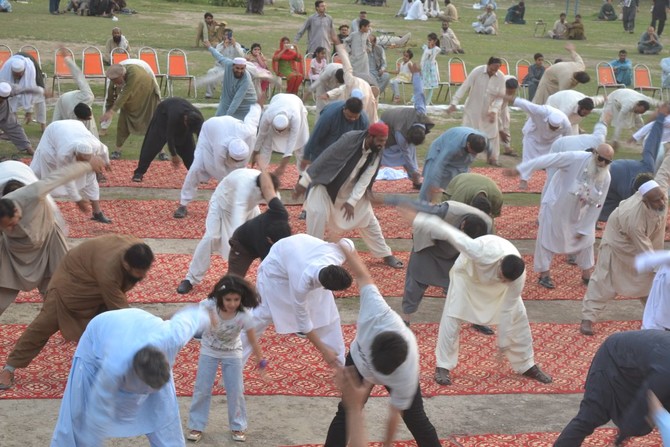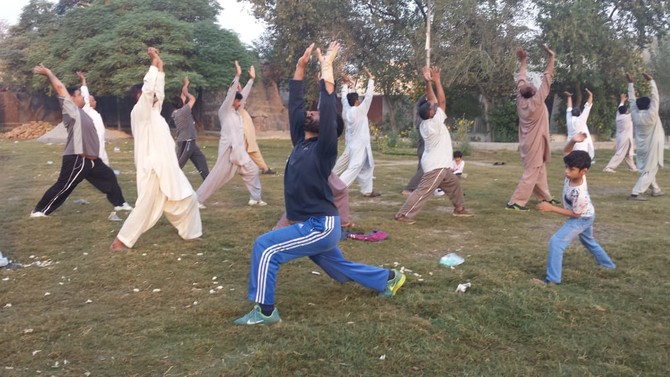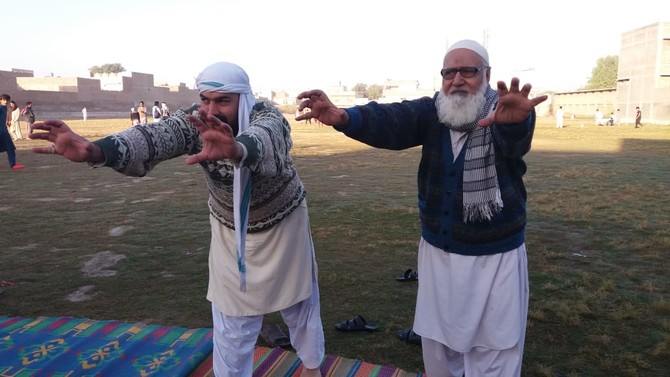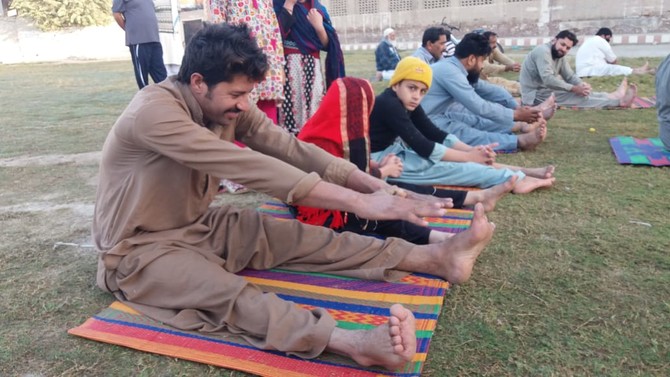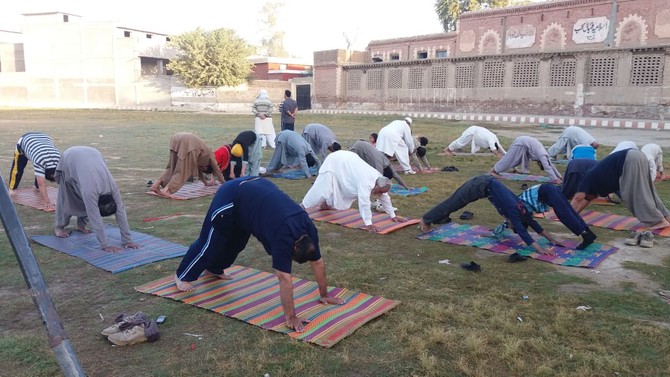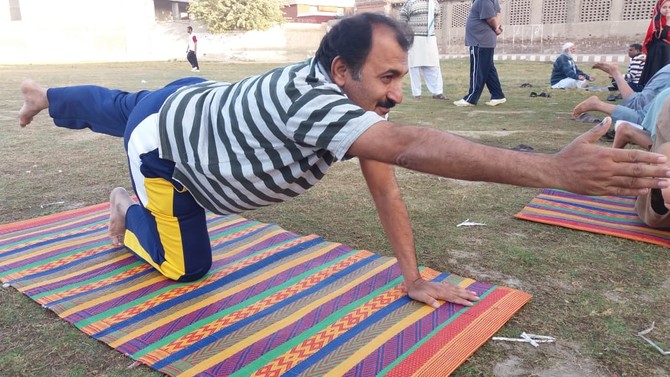DERA ISMAIL KHAN: Seventy-year-old Gulzar Ahmad was walking past a park near his home in the city of D.I. Khan, in Khyber-Pakhtunkhwa, when he heard roars of laughter. A group of men of all ages were laughing as though they had just heard a really good joke. But, Ahmad noticed, no one was telling jokes or even really talking.
“In the beginning I thought they were some crazy people — now I am one of them,” he said.
What Ahmad was witnessing was people indulging in laughter therapy, which aims to reduce stress. It was part of a yoga session, which until recently was something that not many people in the district were familiar with.
If anywhere needs its share of laughs, it is D.I. Khan. Dera Ismail Khan, to give it its full name, is the adjoining district to South Waziristan, which is one of seven tribal districts in Pakistan and shares a border with Afghanistan. Following the US invasion of Afghanistan in 2001, there was a huge influx of refugees in South Waziristan, which spilled over into D.I.Khan.
Subsequent military operations in the region added to the upheaval for residents of the underdeveloped district.
The first yoga group in the city was established at Haq Nawaz Park in 2015 by Mohammed Khalid Ali Zai, a retired military colonel.
“I wanted to do something for my native region, where I was born,” he said. “The people of the city have faced the brunt of terrorism, which spoils their lives.
That’s why I wanted to serve the population and help them keep physically fit.
“The city no longer belongs only to the people of D.I. Khan but also to the adjacent Waziristani people as well. They have been targeted by a plague of militancy for many years, which has destroyed them financially, mentally and psychologically. My dream is to see the public parks full of people and the hospitals empty.”
With people of all ages increasingly falling victim to a variety of skin, eye, stress and anxiety-related diseases, a new yoga and fitness club has opened in the heart of the city to help people stay healthy and overcome any problems. The Town Hall Yoga Club, which is for women only, provides basic fitness training and classes free of charge in the afternoons and evenings.
“Here, the majority of women are housewives and busy with domestic activities,” said Ghazala Shaheen, a yoga instructor at the club. “This is the perfect place where they can come and exercise, which ultimately helps them relieve their stress. Staying at home has made these women the victims of obesity, diabetes, high blood pressure and other diseases.”
She said that that the popularity of the club has grown quickly: “We started with just few ladies but now, after only two weeks, we have about 60. I am hopeful that soon the numbers will rise and we will have to open new centers.”
It’s not only older women who are showing interest in the sessions, but also college and university students.
“D.I. Khan is a small city,” said Sana, a student at Gomal University. “It has few options for going out. We are feeling much better, mentally and physically, since the opening of this yoga center. Its not just a place to practice yoga but a good way to mingle with other people.”
She has also noticed improvements to her health and wellbeing, too. “Before we used to breath through our mouths. Yoga has taught us to close our mouths and inhale through our noses, which is the first step of yoga,” she said, adding that the trainers have shown her how to improve the condition of her body and respiratory system.
Nizamuddin Mehsud, a welfare officer in the city who hails from the Makin subdivision of South Waziristan, said that Yoga sessions had helped him improve his digestive system and lose weight.
“I can feel huge difference in my health,” he said, “I would recommend yoga, especially for elderly people. It’s a very good activity and helps in reducing the pain that our people have been carrying in their heads for more than a decade.”
Shoaib Alizai is a lawyer in D.I. Khan and also works as an instructor at the yoga center.
“I am happy to see more and more people joining the sessions,” he said. “Now we are conducting our sessions twice a day, morning and afternoon. There is no age restriction. Now even kids are joining us, which is very encouraging. We are seeing good results among people with diabetes, obesity and orthopedic problems.”
Doctor Muhammad Waseem Akbar, chairman of the department of media studies at Gomal University, teamed up with Khalid Ali Zai to raise awareness of the benefits of yoga among the people of the city. It was not easy at first to convince people to attend the sessions. Initially, they started practicing yoga in public parks, where they could reach people easily. As the movement gained momentum, at least six yoga centers were established in the city.
“This region had faced a lot of hardships in many ways, be it economic, psychological or financial,” said Akbar. “I felt a lot of stress among the students and that was the triggering point to launch something new for the local community that could eventually help them find peace.
“Our basic aim was attract people who had been suffering from psychiatric and psychological diseases, as those people can contract other diseases in hospitals. Such patients need an alternative place with a good environment where they can exchange their views.”
The war on terror has had a huge impact on the lives of people in the region and it will take time to heal, he added.
“Now the people are coming to us after seeing the effects that Yoga can have on their lives and bodies,” said Akbar.
Yoga trends in D.I. Khan — once a Taliban gateway
Yoga trends in D.I. Khan — once a Taliban gateway

Pakistani generals vow to ‘decimate’ militants a day after school bus bombing kills four children

- The meeting terms the attack a ‘reprehensible violation’ of international norms due to the deliberate targeting of children
- Field Marshal Asim Munir describes the people of Pakistan as the military’s ‘greatest strength’ following the India standoff
ISLAMABAD: Pakistan’s top generals on Thursday vowed to “decimate” militant groups operating in its western provinces of Balochistan and Khyber Pakhtunkhwa, a day after a vehicle-borne improvised explosive device targeted a school bus in the Khuzdar district in the southwest, killing four children and two adults.
The military’s pledge follows a sharp escalation in militant violence across Pakistan, particularly in Balochistan, where separatist groups like the Baloch Liberation Army (BLA) have launched increasingly coordinated attacks on civilians and security forces. Earlier this year, a BLA assault on a passenger train led to a hostage situation, reflecting the growing scale and sophistication of the insurgency.
Islamabad has repeatedly accused India of backing these groups to destabilize the country, an allegation New Delhi has denied, attributing Pakistan’s security troubles to internal failures.
Thursday’s statement followed a meeting of Pakistan’s top army leadership to review the country’s internal and external security environment. The huddle, chaired by Field Marshal Asim Munir, was the first since a recent military standoff with India, during which both sides exchanged missile and drone attacks.
“The Forum deliberated in depth on the threat posed by India-backed terrorist proxies operating in Balochistan and Khyber Pakhtunkhwa,” the military’s media wing, Inter-Services Public Relations (ISPR), said in a statement.
“The Forum resolved that Pakistan will never allow its peace to be compromised by externally sponsored terrorism,” it continued. “The Armed Forces, in close synergy with intelligence and law enforcement agencies, will pursue all proxies and facilitators of terrorism with unrelenting resolve. These hostile elements, trained and financed to incite chaos and fear, will be dismantled and decimated with full force of national will and institutional strength.”
The generals condemned the Khuzdar attack as a “reprehensible violation” of international norms, particularly due to the deliberate targeting of children.
They also offered prayers for victims of both the Khuzdar bombing and recent casualties from Operation Bunyanum Marsoos, the military campaign launched in response to Indian strikes.
Field Marshal Munir reiterated Pakistan’s strategic stance on national defense, declaring that “no one can coerce Pakistan through the use or threat of force.”
He also praised the professionalism and readiness of the armed forces and lauded the resilience of Pakistani civilians, youth and political leadership during recent hostilities.
“The people of Pakistan are our greatest strength,” he said during the meeting. “We remain committed to their trust and expectations in our shared struggle against any foreign aggression, terrorism and extremism.”
Pakistan seeks World Bank’s technical help to fast track $20 billion development framework

- The Country Partnership Framework was approved by the World Bank’s executive directors in January
- It aims to support Pakistan’s development by promoting private sector-led growth, climate resilience
KARACHI: Pakistan on Thursday sought the World Bank’s technical assistance to fast track the implementation of the Country Partnership Framework (CPF) discussed between the two sides earlier this year, according to an official statement circulated by the finance ministry.
The World Bank’s Board of Executive Directors endorsed the framework in January, aiming to support Pakistan’s long-term development by building human capital, promoting private sector-led growth and enhancing climate resilience through up to $20 billion in pledged lending over the next decade.
A World Bank delegation led by Managing Director for Operations Anna Bjerde met with Finance Minister Muhammad Aurangzeb in Islamabad during the day to review the Bank’s financing portfolio and strengthen bilateral cooperation.
“We are focused on ensuring that climate resilience and sustainable development remain at the heart of our economic planning,” Aurangzeb said, according to the statement. “The CPF represents an important opportunity, and we aim to implement it with full coordination across key ministries and stakeholders.”
The finance ministry said Aurangzeb requested the visiting delegation “to provide technical leadership and assistance to streamline processes and ensure a prioritized and focused rollout of the CPF.”
Bjerde praised Pakistan for continuing with difficult economic reforms under challenging circumstances and for aligning its growth with environmental sustainability.
She also reiterated the Bank’s support for initiatives in areas such as taxation, energy and social protection, while emphasizing girls’ education and women’s empowerment as critical to human capital and economic resilience.
Later in the day, the delegation also met Prime Minister Shehbaz Sharif.
According to a separate statement circulated by Sharif’s office, the prime minister welcomed the delegation and thanked the World Bank for playing a key role in the country’s development.
“We are grateful to the World Bank for the Country Partnership Framework, under which development investments exceeding $20 billion will be made in Pakistan,” he said.
Bjerde, in turn, commended Pakistan’s macroeconomic performance and recent stabilization efforts, describing the CPF as a “model” for other countries.
The meeting was also attended by federal ministers, advisers, parliamentarians and senior government officials along with World Bank Country Director Najy Benhassine.
Pakistan says open to dialogue with India, with Saudi Arabia, UAE among neutral venue options

- Pakistan’s deputy prime minister says dialogue with India has to take place and will cover all outstanding issues
- Ishaq Dar says ceasefire is holding between the two states, with troops moving back to pre-standoff positions
ISLAMABAD: Pakistan’s Deputy Prime Minister Ishaq Dar said on Thursday composite talks with India would be held at a neutral venue, such as Saudi Arabia, the United Arab Emirates (UAE) or any other mutually acceptable country, once New Delhi was ready for dialogue.
His statement followed a US-brokered ceasefire announced by President Donald Trump on May 10 to halt missile, drone and artillery exchanges between the two nuclear-armed neighbors in the wake of a deadly gun attack in Indian-administered Kashmir last month that killed 26 tourists. New Delhi blamed Pakistan for the assault, though Islamabad denied involvement.
US Secretary of State Marco Rubio subsequently mentioned after the ceasefire the two South Asian rivals had agreed to address a broad range of issues in a meeting at a neutral venue. However, the Indian authorities maintained any dialogue with Pakistan would be limited to the issue of “terrorism” and have not shown any interest so far in the said diplomatic engagement.
“The venue of the talks will be the place acceptable to both,” Dar said during a media briefing in Islamabad. “There are many candidates for it. It can be Saudi Arabia, the United Arab Emirates or any other country.”
Dar maintained talks had to be held between the two countries, adding Pakistan was ready to engage whenever India was prepared.
“We are not in a hurry and will initiate dialogue when India will be ready,” he continued. “The venue will also be decided at that time.”
The deputy prime minister said the dialogue would cover all issues between the two countries.
“It will be a composite dialogue including everything,” he informed. “Terrorism will be part of it as we are ready to talk on this with all countries because we also want to eliminate the menace of terrorism as we are the biggest victim of it.”
Dar said the ceasefire was holding, though he expressed concern over “irresponsible statements” from Indian officials.
“I think the political compulsion is coming in front of them [the Indian leaders],” he said, adding the ceasefire was maintained by the armed forces of the two countries, with the director generals of military operations on both sides in regular communication with each other.
He also informed both countries were gradually restoring their forces to the pre-standoff positions.
“It won’t take months, it will be completed within the next few days,” he added.
Dar also spoke about his recent visit to China, where he attended a trilateral dialogue with China and Afghanistan, saying both countries had agreed to strengthen their diplomatic relations.
Since the Taliban takeover of Kabul, Pakistan-Afghanistan relations have remained strained, marked by border tensions, security concerns and a lack of trust.
Diplomatic engagement between Kabul and Islamabad have also remained limited, with both countries maintaining ties at the chargé d’affaires level rather than through full ambassadors.
“On the request of China, both countries agreed to enhance our diplomatic relations, though it will take time to complete procedures,” he added.
The deputy prime minister reiterated Pakistan and China had agreed to extend their joint multibillion-dollar corridor project to Afghanistan, including the construction of a road from Peshawar to Kabul to improve connectivity.
Pakistan FY26 budget to continue fiscal consolidation, focus on IMF guidelines — analysis

- Islamabad is currently holding budget talks with the IMF, likely to conclude this week
- Government has committed to fiscal consolidation in FY26 budget to ensure debt sustainability
KARACHI: Pakistan will continue fiscal consolidation, focus on IMF guidelines and bring untaxed and low tax areas into the tax net as it announces its federal budget for fiscal year 2025-26 next month, a top Pakistani brokerage house said in a budget review
Islamabad is currently holding budget talks with the IMF, which earlier this month approved a loan program review for Pakistan, unlocking a $1 billion payment which the State Bank of Pakistan said had been received. A fresh $1.4 billion loan was also approved under the IMF’s climate resilience fund.
“We expect this budget to continue fiscal consolidation, focus on IMF guidelines and bring untaxed/low tax areas in tax net,” Topline Securities said in a budget review.
The brokerage house said the government had committed with the IMF to continue with fiscal consolidation in the FY26 budget to ensure debt sustainability.
“The government targets primary surplus of 1.6% of GDP (vs. 2.0-2.1% of GDP in FY25), a surplus for the third consecutive year after two decades. The government has also committed to use any windfall dividend expected from the central bank over and above 1% of GDP to retire debt,” the review said.
The analysis predicted the Federal Board of Revenue’s FY26 tax revenue growth target could be the lowest in six years.
“FBR revenue target is expected at Rs14.1-14.3 trillion, up 16-18% YoY, which will be the lowest percent growth in the last 6 years,” it said.
The FBR has achieved a five-year revenue Compound Annual Growth Rate of 25% from FY21-25.
“We believe, out of this required 16-18% growth, approximately 12% would be achieved through autonomous growth driven by real GDP growth of 3.6% and inflation of 7.7%. The remaining 4-5% growth translates into additional tax measures of Rs500-600 billion,” the analysis estimated.
Revenue measures expected include a change in the GST calculation price of sugar, the likely introduction of taxes on pension, retailers and wholesalers and a likely increase in federal excise duty on cigarettes, fertilizer products and pesticides by 500bps. A tax on the income of freelancers, vloggers and YouTubers is also expected.
“Government is expected to announce some relief measures namely (1) extension in exemption limit on salary or reduction of tax rate by 2.5% for all salary brackets, (2) rationalization of duties on trade, (3) likely housing finance subsidy, (4) inflation adjustment in minimum salary and unconditional cash transfer, and (5) some rationalization in super tax,” the analysis said.
It said the government would reportedly set a GDP growth target of 3.5-4.5% “while we expect GDP growth target for FY26 at 3.5-4.0% led by services.”
The analysis predicted the budget was likely to be neutral for the stock market in the short-term, neutral to positive for cement, steel, oil and gas, consumers, and independent power producers, and neutral for oil marketing firms, IT, banks, pharma, autos and textile.
Pakistan’s 37-month $7 billion IMF loan program, approved on Sept. 25, 2024, aims to build resilience and enable sustainable growth. Key priorities include entrenching macroeconomic sustainability through implementation of sound macro policies, including rebuilding international reserve buffers and broadening of the tax base; advancing reforms to strengthen competition and raise productivity and competitiveness; reforming state-owned enterprises and improving public service provision and energy sector viability; and building climate resilience.
Highlighting progress in Pakistani policies to stabilize the economy, the IMF said earlier this month when it approved the latest tranche that Pakistan’s fiscal performance had been strong, with a primary surplus of 2.0% of GDP achieved in the first half of FY25, keeping Pakistan on track to meet the end-FY25 target of 2.1% of GDP.
“Inflation fell to a historic low of 0.3% in April, and progress on disinflation and steadier domestic and external conditions, have allowed the State Bank of Pakistan to cut the policy rate by a total of 1100 bps since June 2025,” the IMF added.
“Gross reserves stood at $10.3 billion at end-April, up from $9.4 billion in August 2024, and are projected to reach $13.9 billion by end-June 2025 and continue to be rebuilt over the medium term.”
Pakistan’s second biggest city Lahore sizzles amid scorching heatwave

- Met Office warns of heatwave from May 20-24, temperatures to be 4-6 degrees above average in three main provinces
- In June 2024, almost 700 people died in heatwave in less than a week, 2015 heatwave claimed over 2,000 lives in Karachi alone
LAHORE: Pakistan’s second biggest city, Lahore, sizzled under scorching heat this week as residents tried to stay hydrated in temperatures of 43 degrees Celsius (109 Fahrenheit).
The Pakistani Meteorological Office on Monday issued a heatwave alert saying temperatures would be four to six degrees above average in the Sindh, Punjab and Balochistan provinces from May 20-24.
The Met Office also advised people to avoid prolonged exposure to direct sunlight and stay hydrated.
“The heat is so intense in Lahore at the moment that it is difficult to go out. People should take caution, wear caps soaked in water, and they should drink plenty of water,” resident Wasif Khan said.
“They should use sunglasses. There are juice stalls at different places, they can consume that. Anyway, they should protect themselves from heat.”
Pakistan experiences a long and hot summer season.
“The work cannot stop. We have to carry out our work in any circumstances,” resident Mohammad Shehzad said as he poured a bottle of cold water on his head.
“I am drinking juices and trying to remain under shade to protect myself from the heat. You know, the work goes on whether it is intense heat or it is very cold.”
The current heatwave comes amid increasingly erratic climate patterns across South Asia, with cities in Pakistan experiencing more frequent and intense heat waves in recent years, a trend climate experts link to global warming and climate change.
A 2015 heatwave claimed over 2,000 lives in Karachi alone while floods in 2022 left more than 1,700 dead and over 33 million displaced nationwide.
In June 2024, almost 700 people died in a heat wave in less than a week, with most deaths recorded in the port city of Karachi and other cities of the southern province of Sindh, according to the Edhi Foundation charity.


